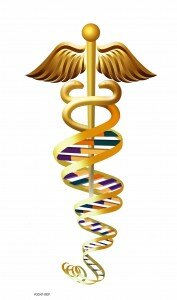 Over at Nature News, Erika Check Hayden has a post about a recent Science Translational Medicine paper by Bert Vogelstein and colleages looking at the potential predictive power of genetics. The take-home message from the study (or at least the message that has been taken home by, e.g., this NYT article) is that DNA does not perfectly determine which disease or diseases you may get in the future. This take home message is true, and to me relatively obvious (in the same way that smoking doesn’t perfectly determine lung cancer, or body weight and dietary health doesn’t perfectly determine diabetes status).
Over at Nature News, Erika Check Hayden has a post about a recent Science Translational Medicine paper by Bert Vogelstein and colleages looking at the potential predictive power of genetics. The take-home message from the study (or at least the message that has been taken home by, e.g., this NYT article) is that DNA does not perfectly determine which disease or diseases you may get in the future. This take home message is true, and to me relatively obvious (in the same way that smoking doesn’t perfectly determine lung cancer, or body weight and dietary health doesn’t perfectly determine diabetes status).
A lot of researchers have had a pretty negative reaction to this paper (see Erika’s storify of the twitter coverage). There are lots of legitimate criticism (see Erika’s post for details), but to be honest I suspect that a lot of this is a mixture of indignation and sour grapes that this paper, a not particularly original or particularly well done attempt to answer a question that many other people have answered before, got so much press (including a feature in the NYT). A very large number of people have tried to quantify the potential predictive power of genetics for a number of years – why was there no news feature for me and Jeff, or David Clayton, or Naomi Wray and Peter Visccher, or any of the other large number of stat-gen folks who have been doing exactly these studies for years. ANGER RISING and so forth.
But of course, the reason is relatively obvious. Continue reading ‘Identical twins usually do not die from the same thing’
 I have no strong family history of any disease, despite having 7 blood aunts and uncles and countless cousins. So when I sent my spit off to 23andMe at the start of the Genomes Unzipped project, I was expecting something very similar to
I have no strong family history of any disease, despite having 7 blood aunts and uncles and countless cousins. So when I sent my spit off to 23andMe at the start of the Genomes Unzipped project, I was expecting something very similar to  RSS
RSS Twitter
Twitter
Recent Comments